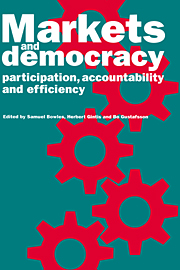Book contents
- Frontmatter
- Contents
- List of figures
- List of tables
- Preface
- 1 Post-Walrasian political economy
- Part I Agency, incentives, and democratic accountability
- Part II Institutions and institutional change
- Part III Conditions for the success of the democratic firm
- Part IV Productivity, distribution, and power
- 12 Cooperation, conflict, and control in organizations
- 13 Wage bargaining and the choice of production technique in capitalist firms
- Part V Ownership, participation and capital markets
- Part VI Political democracy and economic democracy
- Bibliography
- Author index
- Subject index
13 - Wage bargaining and the choice of production technique in capitalist firms
Published online by Cambridge University Press: 05 March 2012
- Frontmatter
- Contents
- List of figures
- List of tables
- Preface
- 1 Post-Walrasian political economy
- Part I Agency, incentives, and democratic accountability
- Part II Institutions and institutional change
- Part III Conditions for the success of the democratic firm
- Part IV Productivity, distribution, and power
- 12 Cooperation, conflict, and control in organizations
- 13 Wage bargaining and the choice of production technique in capitalist firms
- Part V Ownership, participation and capital markets
- Part VI Political democracy and economic democracy
- Bibliography
- Author index
- Subject index
Summary
Introduction
Does it matter who owns and directs the means of production? In particular, does the structure of ownership and command influence the choice of production technique in any important way? Given complete and competitive markets, the answer to the latter question is “no,” as illustrated by the first welfare theorem for production economies: existence of Walrasian equilibrium implies that only efficient techniques are adopted, no matter how ownership is divided or who directs production. This is an example of what Bowles and Gintis (1988) have termed the principles of “neutrality of property assignment” and “irrelevance of command.”
These principles may not be supported in the absence of complete and competitive markets. In this chapter, we explore the implications of distributional conflict in labor markets for the choice of production techniques in capitalist firms. Such conflicts stem from possible bilateral monopoly conditions arising from the presence of significant mutual costs of exit from given employment relationships. Potential sources of exit cost in labor markets derive from such problems as search, factor-specificity, asymmetric information, and task idiosyncrasy, which are frequently encountered in such markets.
We study the distribution of production rents in capitalist firms as a bargaining relationship between owners of firms and the labor teams they employ. Following the seminal work of Rubinstein (1982), we model the relationship as a game in extensive form in which bargaining proceeds over real time and is costly to the participants. We relate equilibrium outcomes to the structure of ownership, and suggest that the choice of production technique in capitalist firms may be driven by considerations of bargaining power as well as of efficiency.
- Type
- Chapter
- Information
- Markets and DemocracyParticipation, Accountability and Efficiency, pp. 217 - 228Publisher: Cambridge University PressPrint publication year: 1993
- 2
- Cited by

